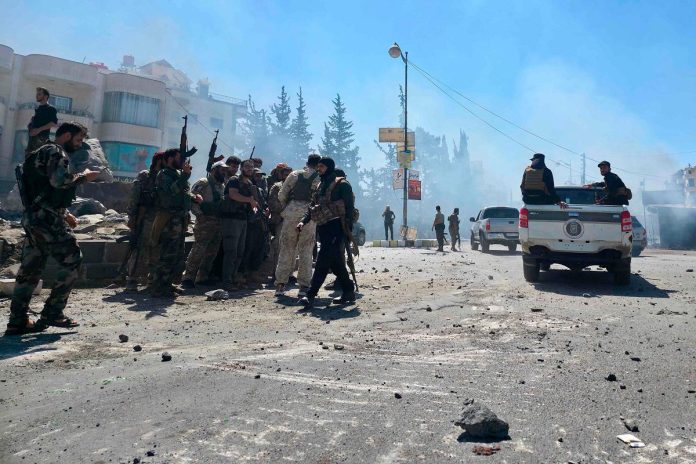SWEIDA: Syrian government forces have entered the majority Druze city of Sweida following deadly clashes between local factions and Bedouin tribes that left nearly 100 people dead.
The interior ministry confirmed the deployment, stating that troops were sent to restore order after days of escalating violence.
The southern city, previously under the control of armed Druze factions, saw religious leaders approve the government intervention, urging fighters to surrender their weapons. A curfew has been imposed in an effort to curb further bloodshed.
Military columns advanced toward Sweida on Tuesday morning, with heavy artillery positioned nearby. The defence ministry later announced their entry into the city, calling on residents to remain indoors and report any suspicious movements. An AFP correspondent reported hearing explosions and gunfire as troops moved in.
Clashes erupted over the weekend after Bedouin gunmen abducted a Druze vegetable vendor on the highway to Damascus, triggering retaliatory kidnappings. The Syrian Observatory for
Human Rights documented 99 fatalities since Sunday, including 60 Druze, 18 Bedouin fighters, 14 security personnel, and seven unidentified individuals in military uniforms.
Druze religious authorities initially called for a ceasefire and expressed no opposition to the central government. However, Sheikh Hikmat al-Hijri, one of Sweida’s spiritual leaders, resisted the security forces’ arrival, demanding international protection instead.
Israel, which has positioned itself as a protector of Syria’s Druze community, conducted airstrikes on Syrian tanks on Monday. Defence Minister Israel Katz stated the attacks served as a warning against harming the Druze population.
The conflict highlights ongoing instability under interim leader Ahmad al-Sharaa, who took power after the ousting of Bashar al-Assad. The Druze, followers of an offshoot of Shiite Islam, are concentrated in Sweida province, where tensions with Bedouin tribes have flared periodically.
Residents described living in fear as shelling intensified. “We lived in a state of extreme terror—the shells were falling randomly,“ said Abu Taym, a 51-year-old father.
Others, like Amal, a 46-year-old woman, feared a repeat of past massacres. “We are not against the state, but we are against surrendering our weapons without a state that treats everyone the same,“ she added.
Defence Minister Murhaf Abu Qasra urged troops to “protect your fellow citizens” and restore stability. The violence underscores deep-seated divisions in a region still grappling with the aftermath of Syria’s civil war. – AFP







